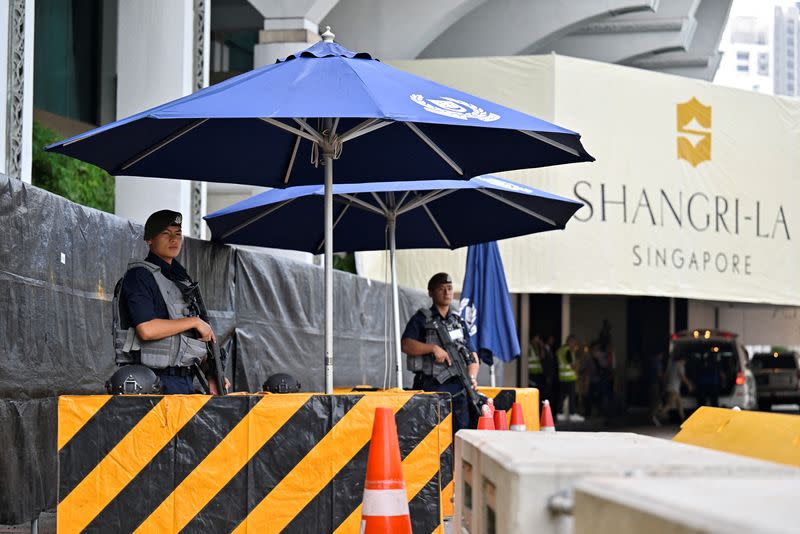US-China, wars, and South China Sea likely to dominate Asian security meeting

By Xinghui Kok
SINGAPORE (Reuters) - The fraught relationship between China and the United States is expected to loom over Asia's top security meeting this week, as are the wars in Ukraine and Gaza, and simmering South China Sea tensions.
The Shangri-La Dialogue, which attracts top defence officials, senior military officers, diplomats, weapons makers and security analysts from around the globe, will take place from May 31 to June 2 in Singapore.
About 600 delegates from nearly 50 countries will attend the meeting, which opens with a keynote address by Filipino President Ferdinand R. Marcos Jr, who has said new South China Sea rules outlined by China's coast guard were an escalation and "worrisome".
Marcos told reporters on Wednesday it was significant that he was asked to talk about the South China Sea and that he would present his country's position on the issue.
"This affects the region and it affects the world," he said.
Apart from the U.S. delegation headlining Saturday's speech and China featuring on Sunday, this year's edition includes a special session by Indonesia's President-elect Prabowo Subianto, who has said Indonesia was very open to both the U.S. and China.
Analysts say the dialogue is useful for the bilateral and multilateral military-to-military meetings on the sidelines of plenary sessions and speeches delivered by defence ministers.
The Russians have been absent from the security meeting since 2022, when the Russian military invaded Ukraine. No Israeli delegation signed up to attend this year.
Last year, China had declined to meet the U.S. delegation. The U.S.-Sino relationship has improved since the last Shangri-la Dialogue, however, and U.S. Defense Secretary Lloyd Austin will meet his Chinese counterpart, Dong Jun, on Friday.
Austin aims to cool tensions with China even as he brings up regional and global security issues, while reassuring Asian allies that Washington is committed to helping the region counter China.
In Beijing, China's defence ministry spokesperson Wu Qian said on Thursday that Dong is heading to the Singapore conference but did not confirm a meeting with Austin.
"China believes that high level China-U.S. strategic military communications helps stabilise military to military relations, China maintains an open attitude towards this," Wu said.
Drew Thompson, a former Pentagon official who is now a scholar at the National University of Singapore, cautioned that the conversation might not lead to meaningful outcomes.
"The U.S. and China have so little trust or consensus about common interests. It doesn't strike me that the dialogue is working towards achieving common objectives, so they are just reading talking points to each other, pushing positions without agreeing on where to go," he said.
Collin Koh, a security scholar at Singapore's S. Rajaratnam School of International Studies, agreed.
"The schism between the two powers is so deep that the Sino-U.S. rivalry has become a structural reality," he said. "Maintaining strategic communications is perhaps the best thing we could hope to ensure this strategic contestation doesn’t degenerate further."
EYES ON CHINA
Although analysts expect the strong Western turnout at the dialogue to keep some focus on Ukraine and Gaza, issues related to China will most likely be front and centre.
Koh said Marcos' keynote would put South China Sea issues on the agenda and Taiwan Strait issues will also be raised by the U.S. and close allies.
"Taiwan is surely a matter of international security concern, especially given the recent Chinese military exercises, but beyond the flagging of crisis stability risks and the potential spectre of tensions erupting into outright armed conflict, I suppose most regional participants will try to avoid making this the dominant agenda for discussion considering the political sensitivities," Koh said.
Thompson said China had antagonised many of its neighbours, and these countries would look to the U.S. to provide security while deepening cooperation.
"We've seen pretty rapid development of the security relationship between Korea and Japan, Australia and Japan, the Philippines and Japan, and South Korea providing more and more arms to the region, particularly Southeast Asia," he said. "This is largely in response to China and its much more aggressive foreign policy and its military build up, which is conducted in a very opaque way."
(This story has been refiled to remove an extraneous letter in paragraph 21)
(Reporting by Xinghui Kok; additional reporting by Flores Mikhail in Manila, Idrees Ali in Washington and Greg Torode in Hong Kong. Editing by Gerry Doyle)


